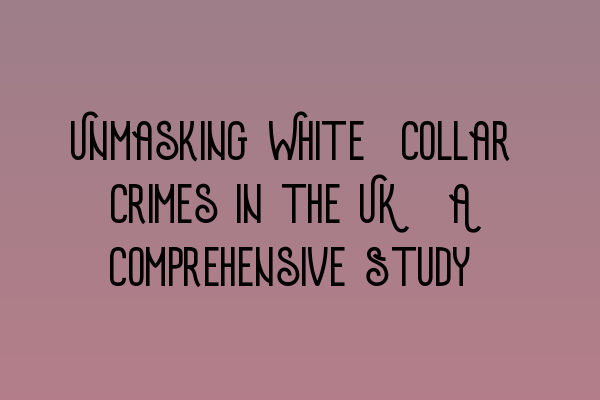Unmasking White-Collar Crimes in the UK: A Comprehensive Study
White-collar crimes have become increasingly prevalent in the UK, posing serious threats to the economy, businesses, and individuals alike. These sophisticated crimes, typically committed by professionals and individuals of high social status, involve deception, fraud, and financial manipulation. Understanding the intricacies of white-collar crimes and the legal framework surrounding them is essential for criminal law practitioners.
What are White-Collar Crimes?
White-collar crimes refer to non-violent offenses that are typically financially motivated and committed by individuals or organizations in the business or professional world. These crimes involve deceit, concealment, or breach of trust, with the intention to obtain financial gain or to deny another person of their rights.
Examples of white-collar crimes include embezzlement, insider trading, bribery, money laundering, fraud, and cybercrime. Perpetrators of these crimes often leverage their knowledge, influence, and position to carry out their illicit activities. The complex nature of white-collar crimes necessitates a comprehensive understanding of the legal and regulatory mechanisms designed to combat them.
Legislation and Enforcement
White-collar crimes in the UK are governed by a range of legislation, guided by the principles of fairness, justice, and accountability. The Fraud Act 2006, for example, criminalizes fraudulent activities such as false representation, failing to disclose information, and abuse of position. The Proceeds of Crime Act 2002 focuses on money laundering, confiscation, and asset recovery.
The enforcement agencies responsible for investigating and prosecuting white-collar crimes in the UK include the Serious Fraud Office (SFO), National Crime Agency (NCA), and the Financial Conduct Authority (FCA). These agencies work collaboratively to identify, gather evidence, and bring perpetrators to justice.
The Role of Criminal Law Practitioners
Criminal law practitioners play a crucial role in unmasking and prosecuting white-collar crimes. Their in-depth knowledge of criminal law, procedure, and their understanding of the complexities surrounding financial transactions and corporate structures enable them to navigate through complex cases effectively.
These legal professionals work closely with law enforcement agencies, conducting investigations, gathering evidence, and building strong cases against individuals accused of white-collar crimes. They ensure that all legal requirements are met, and that their clients’ rights are safeguarded at every stage of the criminal justice process.
Challenges and Emerging Trends
Unmasking white-collar crimes presents unique challenges due to their intricate nature and the evolving strategies employed by perpetrators. Financial transactions involving multiple jurisdictions, sophisticated technological advancements, and complex corporate structures pose substantial challenges during investigations and prosecutions.
However, with the rise of digitalization and the increasing complexities of financial systems, innovative approaches are emerging to combat white-collar crimes. The use of forensic accounting, data analytics, and artificial intelligence has proven valuable in uncovering patterns, identifying irregularities, and assisting in the prosecution of offenders.
Conclusion
Unmasking white-collar crimes requires a comprehensive understanding of the legal framework, legislation, and enforcement mechanisms in place. Criminal law practitioners have a crucial role in unraveling the intricacies of these crimes, gathering evidence, and building robust cases against perpetrators.
By staying updated with emerging trends and employing innovative techniques, criminal law practitioners can effectively combat white-collar crimes and protect the interests of individuals, businesses, and the overall economy. If you would like to learn more about related topics such as contracts and business law, check out our Essentials of Consideration: Understanding the Backbone of Contracts article, which dives into the crucial component of contract formation.
You may also be interested in our article on Express and Implied Terms in Contracts: Decoding Agreement Components, which explores the different types of terms that can be included in a contract.
Furthermore, our article on Mistake in Contract Law: Unraveling the Impact on Agreement Validity delves into the impact of mistakes in contract formation and their effect on the validity of agreements.
If you are interested in understanding the complexities of assigning contract rights and obligations, we recommend reading our article on Assignment of Contracts: Rights, Obligations, and Legal Considerations.
Lastly, our article on Agreements in Contract Law: Determining Legally Binding Commitments explores the essential elements for creating legally binding commitments in contracts.
